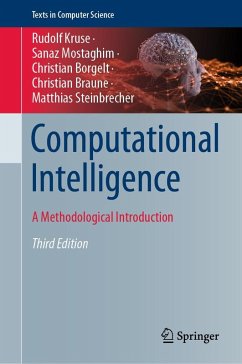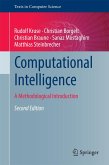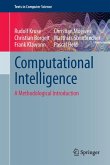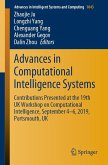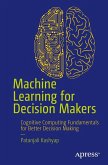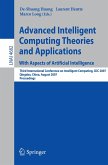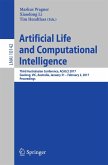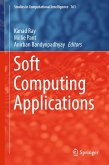Computational intelligence comprises concepts, paradigms, algorithms, and implementations of systems that are intended to exhibit intelligent behavior in complex environments. It relies heavily on (at least) nature-inspired methods, which have the advantage that they tolerate incomplete, imprecise and uncertain knowledge and thus also facilitate finding solutions that are approximative, manageable and robust at the same time.
Fully updated, this new edition of the authoritative textbook provides a clear and logical introduction to Computational Intelligence, covering the fundamental concepts, algorithms and practical implementations behind efforts to develop systems that exhibit intelligent behavior in complex environments. Rather than aim for completeness, the goal is to give a methodical introduction, supporting fundamental concepts and their implementations with explanation of the theoretical background of proposed problem solutions.
Topics and features:
- Offers new material on deep learning, scalarization, large-scale optimization algorithms, and collective decision-making algorithms
- Contains numerous classroom-tested examples and definitions
- Discusses in detail the classical areas of artificial neural networks, fuzzy systems, evolutionary algorithms, and Bayes and Markov networks
- Reviews the latest developments, including such topics as ant colony optimization and probabilistic graphical models
- Provides supplementary material, including module descriptions, lecture slides, exercises with solutions, and software tools
This seminal textbook is primarily meant as a companion book for lectures on the covered topics in the area of computational intelligence. However, it is also eminently suitable as a guidebook for self-study by students and practitioners from industry and commerce.
Dr. Rudolf Kruse is the former leader of the Computational Intelligence Research Group and now Emeritus Professor of the Department of Computer Science at the University of Magdeburg, Germany. Dr. Sanaz Mostaghim is a full Professor of Computer Science and Dr. Christian Braune is a Senior Lecturer at the same institution. Dr. Christian Borgelt is a Professor of Data Science at the Paris Lodron University of Salzburg, Austria. Dr. Matthias Steinbrecher is a Development Architect at SAP SE, Potsdam, Germany.
Dieser Download kann aus rechtlichen Gründen nur mit Rechnungsadresse in A, B, BG, CY, CZ, D, DK, EW, E, FIN, F, GR, HR, H, IRL, I, LT, L, LR, M, NL, PL, P, R, S, SLO, SK ausgeliefert werden.
"The book presents a thorough exposition of the main concepts of computational intelligence. ... It is an interesting book that may serve very well a wide audience, providing material for researchers, students as well as people working in industry." (Catalin Stoean, zbMATH 1500.68001, 2023)
"The authors have written Computational intelligence in such a way that it can serve as both a textbook and a helpful reference book for students and practitioners of computing science and related fields. The presentation is careful and friendly yet technically sound." (Soubhik Chakraborty, Computing Reviews, March 7, 2023)
"The authors have written Computational intelligence in such a way that it can serve as both a textbook and a helpful reference book for students and practitioners of computing science and related fields. The presentation is careful and friendly yet technically sound." (Soubhik Chakraborty, Computing Reviews, March 7, 2023)
From the reviews:
"This book teaches computational intelligence (CI) in a thorough, methodological manner that is theoretically profound and educationally oriented. ... this book is well designed for the independent student who wishes to learn the fundamentals of CI without the need for an instructor. The organization and thorough step-by-step methodology makes it an excellent startup guide for someone who wants to learn CI ... . This book is targeted at beginners, students, or professionals who wish to understand CI." (Mario Antoine Aoun, Computing Reviews, February, 2014)
"The book under review is a textbook that features sub-symbolic approaches developed within the field of Artificial Intelligence ... . It can be used as a companion book for lectures, with exercises and slides to be found on the book's website. With its focus on sub-symbolic approaches, it presents a comprehensive and detailled source of information complementary to other commonly used textbooks in Artificial Intelligence that mostly focus on symbolic approaches." (Jana Köhler, zbMATH, Vol. 1283, 2014)
"The book is a comprehensive treatise on computational intelligence with a focus on the underlying methodology and algorithms. ... The reader can enjoy a comprehensive and systematically arranged exposure of the material. ... The references following each chapter can serve as a list of introductory readings on the individual areas of computational intelligence. ... the reader gains a good sense of computational intelligence as an important endeavor supporting analysis and synthesis of intelligent systems. ... a useful compendium of knowledge for a broad audience." (Witold Pedrycz, Mathematical Reviews, November, 2013)
"This book teaches computational intelligence (CI) in a thorough, methodological manner that is theoretically profound and educationally oriented. ... this book is well designed for the independent student who wishes to learn the fundamentals of CI without the need for an instructor. The organization and thorough step-by-step methodology makes it an excellent startup guide for someone who wants to learn CI ... . This book is targeted at beginners, students, or professionals who wish to understand CI." (Mario Antoine Aoun, Computing Reviews, February, 2014)
"The book under review is a textbook that features sub-symbolic approaches developed within the field of Artificial Intelligence ... . It can be used as a companion book for lectures, with exercises and slides to be found on the book's website. With its focus on sub-symbolic approaches, it presents a comprehensive and detailled source of information complementary to other commonly used textbooks in Artificial Intelligence that mostly focus on symbolic approaches." (Jana Köhler, zbMATH, Vol. 1283, 2014)
"The book is a comprehensive treatise on computational intelligence with a focus on the underlying methodology and algorithms. ... The reader can enjoy a comprehensive and systematically arranged exposure of the material. ... The references following each chapter can serve as a list of introductory readings on the individual areas of computational intelligence. ... the reader gains a good sense of computational intelligence as an important endeavor supporting analysis and synthesis of intelligent systems. ... a useful compendium of knowledge for a broad audience." (Witold Pedrycz, Mathematical Reviews, November, 2013)

